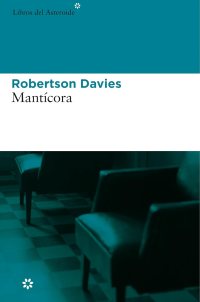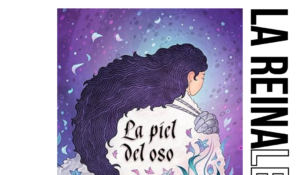
Review of the book “Manticore”, by Robertson Davies
Review/Opinion:
The mysterious death of Canadian tycoon Boy Staunton – who was found drowned in his car at the bottom of Toronto Harbor – has upset his son David, who, unlike the police, is convinced that his father was murdered. Determined to free himself from his obsession, David travels to Zurich to undergo psychoanalysis at the Jung Institute. Forced by psychiatrists to investigate his memory, David will bring to light an extraordinary gallery of characters and memories that will allow him to confront his own demons and, above all, with the memory of his father. Although it can be read independently, this novel constitutes the second part of the Deptford Trilogy, after The Fifth in Discord. This time Davies delves into the deepest regions of the human mind, those where our monsters lurk.
Although it can be read independently, this novel constitutes the second part of the Deptford Trilogy, after The Fifth in Discord. This time Davies delves into the deepest regions of the human mind, those where our monsters lurk.
“Manticore” is a fascinating and enigmatic novel written by acclaimed Canadian author Robertson Davies. First published in 1972, this literary masterpiece is notable for its rich storytelling, compelling characters, and deep exploration of universal themes.
The plot of “Manticore” develops on two intertwined narrative levels. First, we meet David Staunton, a successful lawyer who is at a turning point in his life. Haunted by the death of his father and her troubled relationship with him, David embarks on a journey of self-discovery and redemption, seeking answers through therapy and the study of mythology and Jungian psychology.
The second narrative level is a diary narrative written by Magnus Eisengrim, a famous illusionist and theater actor. Through his diary, Magnus reveals his life from his childhood to his success in show business, offering an alternative and complementary vision of the story of David Staunton. As the two stories intertwine, secrets, hidden plots, and deeper truths about the characters and their connections are revealed.
One of the most notable strengths of “Manticore” is the exceptional character development. Both David Staunton and Magnus Eisengrim are complex, multidimensional characters who evolve throughout the story. David struggles to come to terms with his past and find a sense of identity, while Magnus hides secrets and masks beneath his apparent success. Davies manages to portray the psychology of the characters masterfully, exploring their deepest motivations, desires and fears.
Davies’ prose in “Manticore” is elegant and rich in detail. His narrative style is captivating, and his ability to create vivid, evocative images transports the reader to the settings and events described in the novel. Furthermore, Davies exhibits an expert command of narrative structure by alternating between Magnus’ diary and David’s story, maintaining a fluid pace and constant suspense that entices the reader to continue reading.
Another highlight of “Manticore” is the exploration of deep and universal themes. Davies addresses issues such as identity, redemption, the duality of the human being and the power of illusion. Through David and Magnus, the author examines the nature of truth and the subjective perception of reality. Mythology and Jungian psychology also play an important role in the novel, providing deeper insight into the psychology of the characters and their internal struggles.
Robertson Davies (1913-1995) is one of the most important Canadian authors. He published eleven novels, organized in trilogies: the Salterton Trilogy: At the Mercy of the Tempest, Yeast of Malice and A Mixture of Infirmities; the Deptford Trilogy: The Fifth in Discord, Manticore and The World of Wonders; the Cornish Trilogy: Rebel Angels, That Which Roots in the Bone and The Lyre of Orpheus; and the unfinished Toronto Trilogy, to which Murder and Souls in Sorrow and A Cunning Man belong. He also highlights the short story anthology Holiday Spirit. Ghost stories.
1. **The Search for the Meaning of Life:** The novel follows the story of David Staunton, a lawyer who embarks on a spiritual and psychological journey to discover the true purpose and meaning of his existence. This journey leads him to confront his own inner demons and explore themes of identity, redemption and destiny.
2. **Dreams and the human psyche:** Davies uses dreams as a central element in the narrative, exploring the subconscious of the characters and revealing their deepest desires, fears and internal conflicts. Dreams serve as a window to the characters’ souls and play a crucial role in their development and self-discovery.
3. **The influence of mythology and folklore:** As in other works by Davies, “Manticore” is infused with mythological and folklore references that enrich the plot and add depth to the themes explored. The figure of the manticore, a mythological creature with the body of a lion, a human head and the tail of a scorpion, becomes a powerful symbol that represents the dark and unknown aspects of the human psyche.
4. **The contrast between the material and the spiritual:** Throughout the novel, Davies explores the conflict between materialistic life and spiritual longing. David Staunton, raised in a wealthy and privileged family, becomes dissatisfied with his superficial life and seeks a deeper meaning that transcends wealth and external success.
5. **Redemption through suffering:** David Staunton’s quest leads him to face difficult challenges and trials, which ultimately lead him to a greater understanding of himself and the world around him. Through suffering and struggle, he finds redemption and the possibility of a more authentic and meaningful life.
These points highlight some of the key themes and elements of Robertson Davies’ “Manticore,” a novel rich in symbolism, psychological depth, and spiritual exploration.
Source: https://algunoslibrosbuenos.com/manticora


